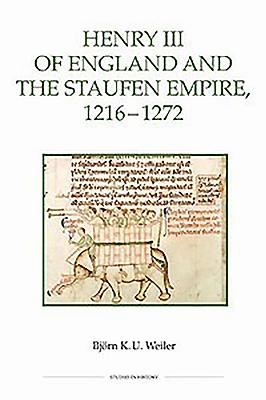
- We will send in 10–14 business days.
- Author: Björn Weiler
- Publisher: Royal Historical Society
- ISBN-10: 0861933192
- ISBN-13: 9780861933198
- Format: 15.6 x 23.4 x 1.4 cm, minkšti viršeliai
- Language: English
- SAVE -10% with code: EXTRA
Henry III of England and the Staufen Empire, 1216-1272 (e-book) (used book) | bookbook.eu
Reviews
Description
Reassessment of the foreign policies and activities of Henry III, revealing them to be more successful than hitherto thought.
Modern historians have frequently maligned Henry III of England (1216-1272) for his entanglements in European affairs. However, this book moves past orthodox opinion to offer a reappraisal of his activities. Using Henry's dealingswith the rulers of the Staufen Empire (Germany, Northern France, Northern Italy and Sicily) as a case study to explore the broader international context within which he acted, the author offers a more varied reading of Henry's "European adventures"; he shows that far from being an expensive aberration, they reveal the English king as acting within the same parameters and according to the same norms as his peers and contemporaries. Moreover, they provide new insights into the structures and mechanisms, the ideals and institutions which defined the conduct of relations between rulers and realms in the medieval West; medieval politics, it is argued, cannot be understood in isolationfrom wider movements, ideals and concepts. The book will be of value not only for historians of medieval England, but also for those with a more general interest in the wider political structures of the pre-modern West. Dr BJORN K. U. WEILER is Lecturer in Medieval History at the University of Wales, Aberystwyth.EXTRA 10 % discount with code: EXTRA
The promotion ends in 21d.19:34:46
The discount code is valid when purchasing from 10 €. Discounts do not stack.
- Author: Björn Weiler
- Publisher: Royal Historical Society
- ISBN-10: 0861933192
- ISBN-13: 9780861933198
- Format: 15.6 x 23.4 x 1.4 cm, minkšti viršeliai
- Language: English English
Reassessment of the foreign policies and activities of Henry III, revealing them to be more successful than hitherto thought.
Modern historians have frequently maligned Henry III of England (1216-1272) for his entanglements in European affairs. However, this book moves past orthodox opinion to offer a reappraisal of his activities. Using Henry's dealingswith the rulers of the Staufen Empire (Germany, Northern France, Northern Italy and Sicily) as a case study to explore the broader international context within which he acted, the author offers a more varied reading of Henry's "European adventures"; he shows that far from being an expensive aberration, they reveal the English king as acting within the same parameters and according to the same norms as his peers and contemporaries. Moreover, they provide new insights into the structures and mechanisms, the ideals and institutions which defined the conduct of relations between rulers and realms in the medieval West; medieval politics, it is argued, cannot be understood in isolationfrom wider movements, ideals and concepts. The book will be of value not only for historians of medieval England, but also for those with a more general interest in the wider political structures of the pre-modern West. Dr BJORN K. U. WEILER is Lecturer in Medieval History at the University of Wales, Aberystwyth.

Reviews